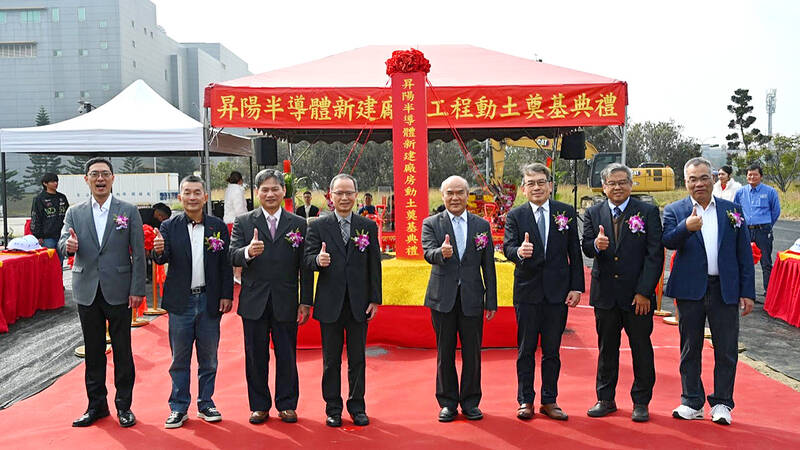Phoenix Silicon International Corp (昇陽半導體), the world’s No. 2 supplier of reclaimed wafers, yesterday broke ground on a NT$2.5 billion (US$76.3 million) plant in Taichung as the company expands capacity to meet rising demand.
The artificial intelligence (AI) boom has boosted the production of advanced chips that power AI servers and other edge devices with AI functions, accelerating demand for reclaimed wafers, Phoenix said in a statement.
AI chips that are made on advanced technologies such as 4-nanometer consume more reclaimed wafers than those with less advanced technologies, as their production requires delicate processing and more equipment testing to ensure optimal yields, the company said.

Photo courtesy of Phoenix Silicon International Corp
Chipmakers use more than two reclaimed wafers for testing and equipment checking to produce one 3-nanometer or 5-nanometer wafer, it said.
Rising consumption of reclaimed wafers after customers start producing 2-nanometer wafers this year is to be a major growth driver for Phoenix, the company said.
About 70 to 75 percent of the company’s reclaimed wafers are used for advanced chips with leading process technologies, it said.
Phoenix plans to expand its capacity by about 23 percent to 800,000 12-inch wafers a year by the end of this year, compared with 630,000 last year, the statement said.
Capacity would rise further when the new Taichung plant starts operating next year, it said.
Reclaimed wafer suppliers usually expand capacity 2.3 times faster than their customers, Phoenix said.
Another driver is customers’ overseas capacity expansion, as one of its key customers is rapidly expanding advanced chip capacity in the US, Phoenix said.
Phoenix did not disclose the name of its customer, but Taiwan Semiconductor Manufacturing Co (台積電) is the only Taiwanese chipmaker that is producing advanced 4-nanometer chips at its first factory in Arizona.
Revenue this year is to expand by a double-digit percentage from NT$3.55 billion last year, the company said.
The reclaimed wafer business accounted for 80 to 85 percent of the company’s revenue in the first half of last year, with wafer thinning making up the remaining 15 to 20 percent, Phoenix said.

MULTIFACETED: A task force has analyzed possible scenarios and created responses to assist domestic industries in dealing with US tariffs, the economics minister said The Executive Yuan is tomorrow to announce countermeasures to US President Donald Trump’s planned reciprocal tariffs, although the details of the plan would not be made public until Monday next week, Minister of Economic Affairs J.W. Kuo (郭智輝) said yesterday. The Cabinet established an economic and trade task force in November last year to deal with US trade and tariff related issues, Kuo told reporters outside the legislature in Taipei. The task force has been analyzing and evaluating all kinds of scenarios to identify suitable responses and determine how best to assist domestic industries in managing the effects of Trump’s tariffs, he

‘SWASTICAR’: Tesla CEO Elon Musk’s close association with Donald Trump has prompted opponents to brand him a ‘Nazi’ and resulted in a dramatic drop in sales Demonstrators descended on Tesla Inc dealerships across the US, and in Europe and Canada on Saturday to protest company chief Elon Musk, who has amassed extraordinary power as a top adviser to US President Donald Trump. Waving signs with messages such as “Musk is stealing our money” and “Reclaim our country,” the protests largely took place peacefully following fiery episodes of vandalism on Tesla vehicles, dealerships and other facilities in recent weeks that US officials have denounced as terrorism. Hundreds rallied on Saturday outside the Tesla dealership in Manhattan. Some blasted Musk, the world’s richest man, while others demanded the shuttering of his

TIGHT-LIPPED: UMC said it had no merger plans at the moment, after Nikkei Asia reported that the firm and GlobalFoundries were considering restarting merger talks United Microelectronics Corp (UMC, 聯電), the world’s No. 4 contract chipmaker, yesterday launched a new US$5 billion 12-inch chip factory in Singapore as part of its latest effort to diversify its manufacturing footprint amid growing geopolitical risks. The new factory, adjacent to UMC’s existing Singapore fab in the Pasir Res Wafer Fab Park, is scheduled to enter volume production next year, utilizing mature 22-nanometer and 28-nanometer process technologies, UMC said in a statement. The company plans to invest US$5 billion during the first phase of the new fab, which would have an installed capacity of 30,000 12-inch wafers per month, it said. The

Taiwan’s official purchasing managers’ index (PMI) last month rose 0.2 percentage points to 54.2, in a second consecutive month of expansion, thanks to front-loading demand intended to avoid potential US tariff hikes, the Chung-Hua Institution for Economic Research (CIER, 中華經濟研究院) said yesterday. While short-term demand appeared robust, uncertainties rose due to US President Donald Trump’s unpredictable trade policy, CIER president Lien Hsien-ming (連賢明) told a news conference in Taipei. Taiwan’s economy this year would be characterized by high-level fluctuations and the volatility would be wilder than most expect, Lien said Demand for electronics, particularly semiconductors, continues to benefit from US technology giants’ effort